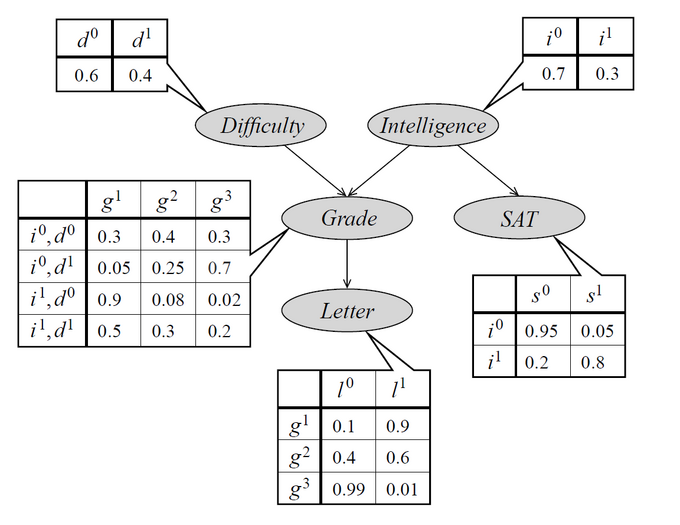Question summary
I had recently asked this question where problems encoding a Bayesian Network were linked to the use of MultinomialDistribution. While that problem can be avoided using EmpiricalDistribution, there remains an issue with using ProbabilityDistribution for larger networks as it seems: While Probability can be used for inference with 4 nodes, it will not evaluate for the "full" example network of 5 nodes -- which still is far removed from real application demands. Why is this so? What can be done about it?
Bayesian Network Example
Again I would like to use the (simple) example that is given on page 53 in Probabilistic Graphical Models (2009), by Daphne Koller and Neir Friedman:
The network has five nodes (random variables):
- Difficulty of a class taken by a student (0 = easy, 1 = hard)
- Intelligence of the student (0 = low, 1 = high)
- Grade achieved by the student (1 = A, 2 = B, 3 = C)
- SAT score of the student (0 = low, 1 = high)
- Letter of recommendation by the teacher (0 = False, 1 = True)
We would like to use this network to do probabilistic inference (causal or evidential) like: "What is the probability of the student achieving an A, given that he is intelligent?"
Encoding the Bayesian Network in Mathematica
Essentially the Bayesian Network is a sparse way to define the joint probability distribution function for the random variables using the chain rule of probability theory:
$ \begin{align} P(I,D,G,S,L) = P(I) \times P(D) \times P(G|I,D) \times P(S|I) \times P(L|G) \end{align} $
I am encoding this in Mathematica as follows:
(* nodes without parents *)
distI = BernoulliDistribution[ 0.3 ]; (* prior probability of high intelligence *)
distD = BernoulliDistribution[ 0.4 ]; (* prior probability of hard class *)
(* nodes with parents = conditional probability distributions *)
(* conditional distribution of the grade *)
cpdG = Function[ { i, d },
With[
{
p = Piecewise[
{
{ { 0.3, 0.4, 0.3 }, i == 0 && d == 0 },
{ { 0.05, 0.25, 0.7 }, i == 0 && d == 1 },
{ { 0.9, 0.08, 0.02 }, i == 1 && d == 0 },
{ { 0.5, 0.3, 0.2 }, i == 1 && d == 1 }
}
]
},
EmpiricalDistribution[ p -> Range[3] ]
]
];
(* conditional distribution for the SAT score *)
cpdS = Function[ i,
With[
{
θ = Piecewise[
{
{ 0.05, i == 0 },
{ 0.8, i == 1 }
}
] (* probability of a high SAT score *)
},
BernoulliDistribution[θ]
]
];
(* conditional probability function for the Letter *)
cpdL = Function[ g,
With[
{
θ = Piecewise[
{
{ 0.9, g == 1 },
{ 0.6, g == 2 },
{ 0.01, g == 3 }
}
]
},
BernoulliDistribution[θ]
]
];
(* BayesNetwork = Joint Probability Distribution Function *)
(* B4 = P(I,D,G,L) *)
distB4 = ProbabilityDistribution[
PDF[ distI, i] PDF[ distD, d] PDF[ cpdG[i,d], g] PDF[ cpdL[g], l],
{i, 0, 1, 1},
{d, 0, 1, 1},
{g, 1, 3, 1},
{l, 0, 1, 1}
];
(* B5 = P(I,D,G,S,L) *)
distB5 = ProbabilityDistribution[
PDF[ distI, i] PDF[ distD, d] PDF[ cpdG[i,d], g] PDF[ cpdS[i], s] PDF[ cpdL[g], l],
{i, 0, 1, 1},
{d, 0, 1, 1},
{g, 1, 3, 1},
{s, 0, 1, 1},
{l, 0, 1, 1}
];
Doing Inference
Now we would like to ask the question as stated above:
Probability[ g == 1 \[Conditioned] i == 1, {i,d,g,l} \[Distributed] distB4 ]
0.74
Probability[ g == 1 \[Conditioned] i == 1, {i,d,g,s,l} \[Distributed] distB5 ]
Probability[ ] is returned unevaluted.
Why is this the case? What can be done about it - after all 5 nodes should not be too far a stretch?


P(I,D,G,S)will work without any problems, so it seems to be the number of nodes that causes trouble. $\endgroup$Whichinstead ofPiecewiseor using functions with pattern tests, e.g.cpdL[ g_?NumericQ] := .... $\endgroup$